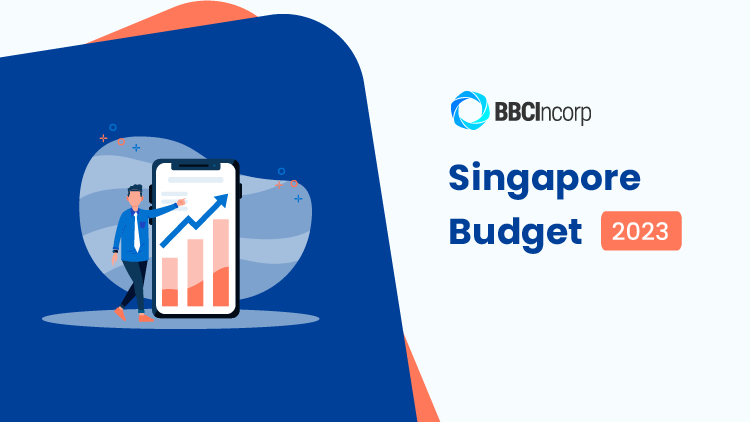
On Tuesday, February 14th, 2023, Finance and Deputy Prime Minister Lawrence Wong announced the 2023 Singapore Budget Statement for the Financial Year 2023, focusing on exploring new capabilities, developing resilient industries, and creating better-paying career opportunities for Singaporeans.
Several adjustments have been made to cope with inflation, the downturn in growth, and tough global competition for businesses affected by the post-COVID economy. This year’s budget statement introduces changes in tax schemes, stamp duties, grants, and more.
The following are the main updates that should be helpful for your business.
Tax changes for businesses
Base Erosion and Profit Shifting Initiative (BEPS 2.0) for MNEs
Singapore is implementing the Global Anti-Base Erosion (GloBE) rules under BEPS Pillar 2 and a Domestic Top-up Tax (DTT) that tops up the Multinational Enterprise (MNE) groups’ effective tax rate to 15%, from businesses with the financial year starting on or after January 1st, 2025.
The new framework that establishes a minimum global tax rate for large enterprises is expected to have a neutral impact on corporate tax revenue and prevent tax evasion.
Double Tax Deduction Scheme for the e-commerce sector
Designed to assist businesses in overcoming initial challenges and thriving in internationalizing via e-commerce, the Double Tax Deduction for Internationalisation (DTDi) scheme is expanded to include a qualifying activity known as the “e-commerce campaign”.
This will cover startup expenses paid to e-commerce platforms and service providers (e.g. business advisory, account creation, content creation, product listing, and placement, etc.). The updated scheme came into effect on February 15th, 2023.
Note
You must obtain Enterprise Singapore’s approval before enjoying DTDi on the new qualifying activities. DTDi support for e-commerce campaigns will be approved for a maximum one-year limit per business on a per-country basis.
The special expenditure cap for the automatic double tax deduction under the scheme is:
- SGD 100,000 per Year of Assessment (YA) for qualifying expenses incurred from April 1st, 2012 to YA 2018
- SGD 150,000 per YA for those incurred from YA 2019 to December 31st, 2025
Financial support for companies
The Enterprise Innovation Scheme
For each YA from YA2024 to YA2028, the Singapore government has offered a 400% tax deduction of qualifying expenditure in the following major activities:
- Research & development: a deduction on the first SGD 400,000 of R&D expenditure incurred in Singapore (e.g. staff costs, consumables, etc.).
- Registration of Intellectual Properties (IPs): a deduction of the first SGD 400,000 of the qualifying IP registration cost, including patents, trademarks, and copyrights.
- Acquiring & licensing IP rights: a deduction on the first SGD 400,000 of the acquiring and licensing IP expenditure.
- Innovation carried out with polytechnics, the Institutes of Technical Education (ITE), and other qualified partners: a deduction for up to SGD 50,000 of qualifying innovation expenditure incurred on qualifying innovation projects.
- Training and skill upgrading: a deduction for training cost via courses approved by SkillsFuture and aligned to Skills Framework.
Furthermore, Singapore also allows additional tax deductions in excess of the above amounts. Find out more about the new Singapore Enterprise Innovation Scheme (EIS).
Meanwhile, SMEs and unprofitable businesses are eligible to convert 20% of their total qualifying expenditure per YA into a cash payout of up to SGD 20,000. Smaller firms that pay little or no taxes can partially use this to cover the cost of their innovation activities.
Singapore Global Enterprise Initiative
The announcement of Budget 2023 includes an SGD 1 billion top-up to the Singapore Global Enterprises initiative, which offers tailored capacity-building programs to support domestic businesses.
Among these programs are opportunities to learn about internationalization and innovation for expanding business partnerships, as well as guidance on cultivating new relationships.
Increase in the National Productivity Fund’s budget
Under Budget 2023, the National Productivity Fund will receive another SGD 4 billion (USD 2.9 million) in funding. By doing so, Singapore intends to attract promising investments that will help companies develop new capabilities, and enhance domestic ecosystems along with workforce skills. These initiatives will ultimately result in high-paying job opportunities.
Governmental support for SMEs
An additional SGD 150 million will be invested in potential SMEs through the SME Co-Investment Fund. The government aims to catalyze an additional SGD 300 million of private investments to support SMEs as well.
On top of that, the current enhancements to the Enterprise Financing Scheme and the Energy Efficiency Grant are extended for another year till 31 March 2024. Several factors, particularly Foodservice, Manufacturing, and Retail businesses, will benefit from continued energy efficiency investments, lowering the impact of increasing electricity costs.
The bottom line
Overall, this year’s budget emphasizes efficient adjustment to attract more valuable investment and build stronger organizational capabilities – a sign that Singapore is determinedly focused on building up its economy against a backdrop of global uncertainty while simultaneously addressing pressing social needs such as job stability and business support measures. For more details on the Singapore Budget 2023, please visit the Ministry of Finance’s site.
Disclaimer: While BBCIncorp strives to make the information on this website as timely and accurate as possible, the information itself is for reference purposes only. You should not substitute the information provided in this article for competent legal advice. Feel free to contact BBCIncorp’s customer services for advice on your specific cases.
Industry News & Insights
Get helpful tips and info from our newsletter!
Stay in the know and be empowered with our strategic how-tos, resources, and guidelines.





